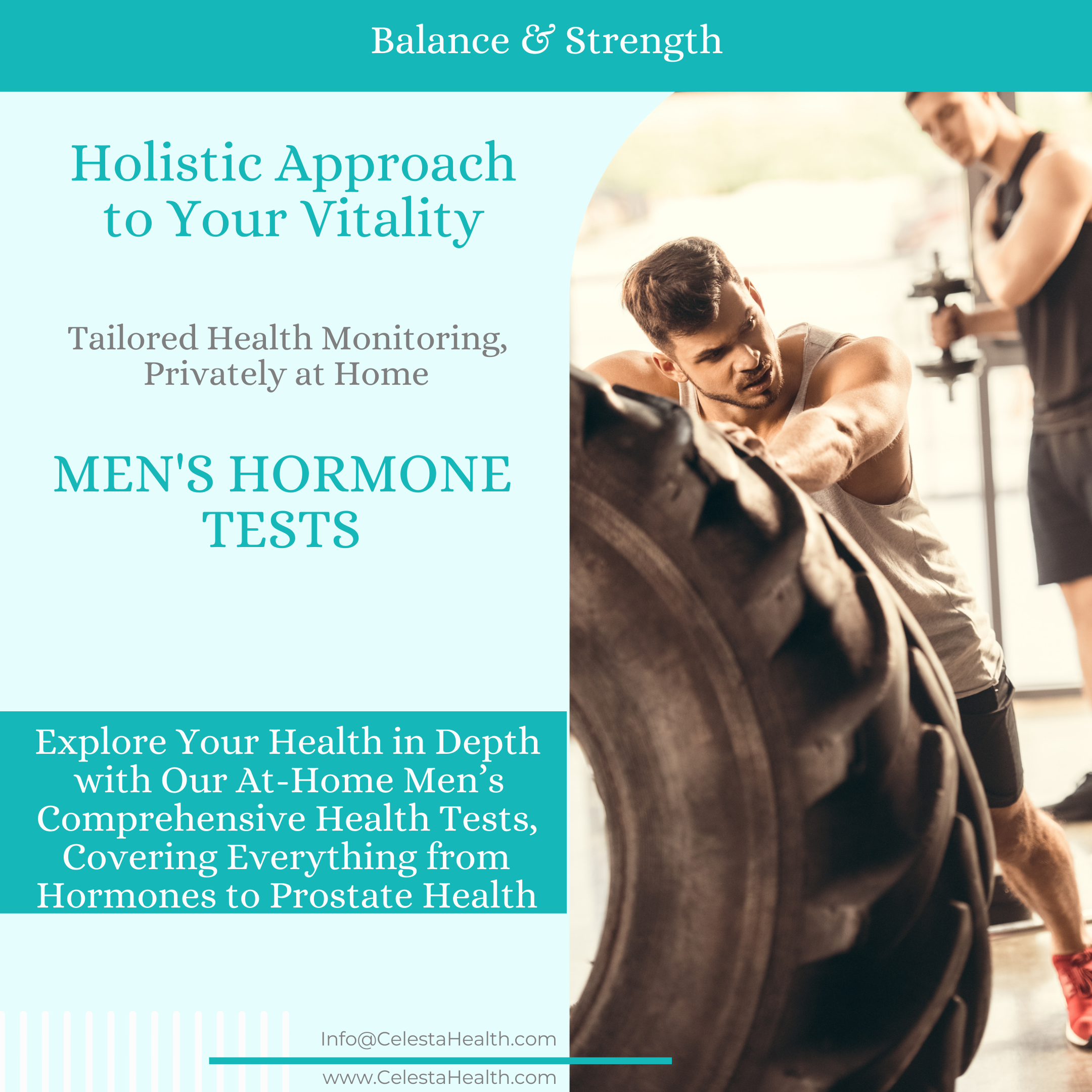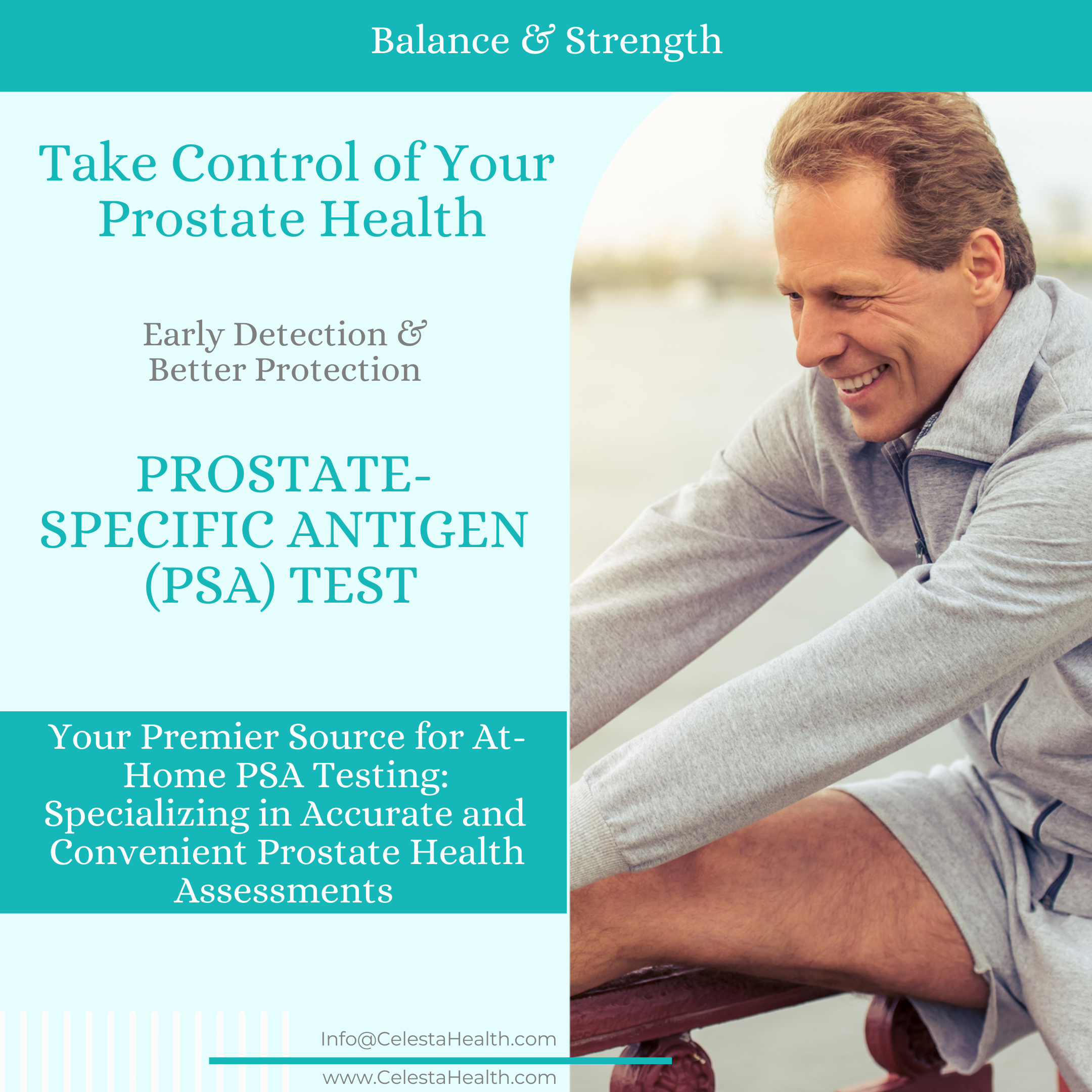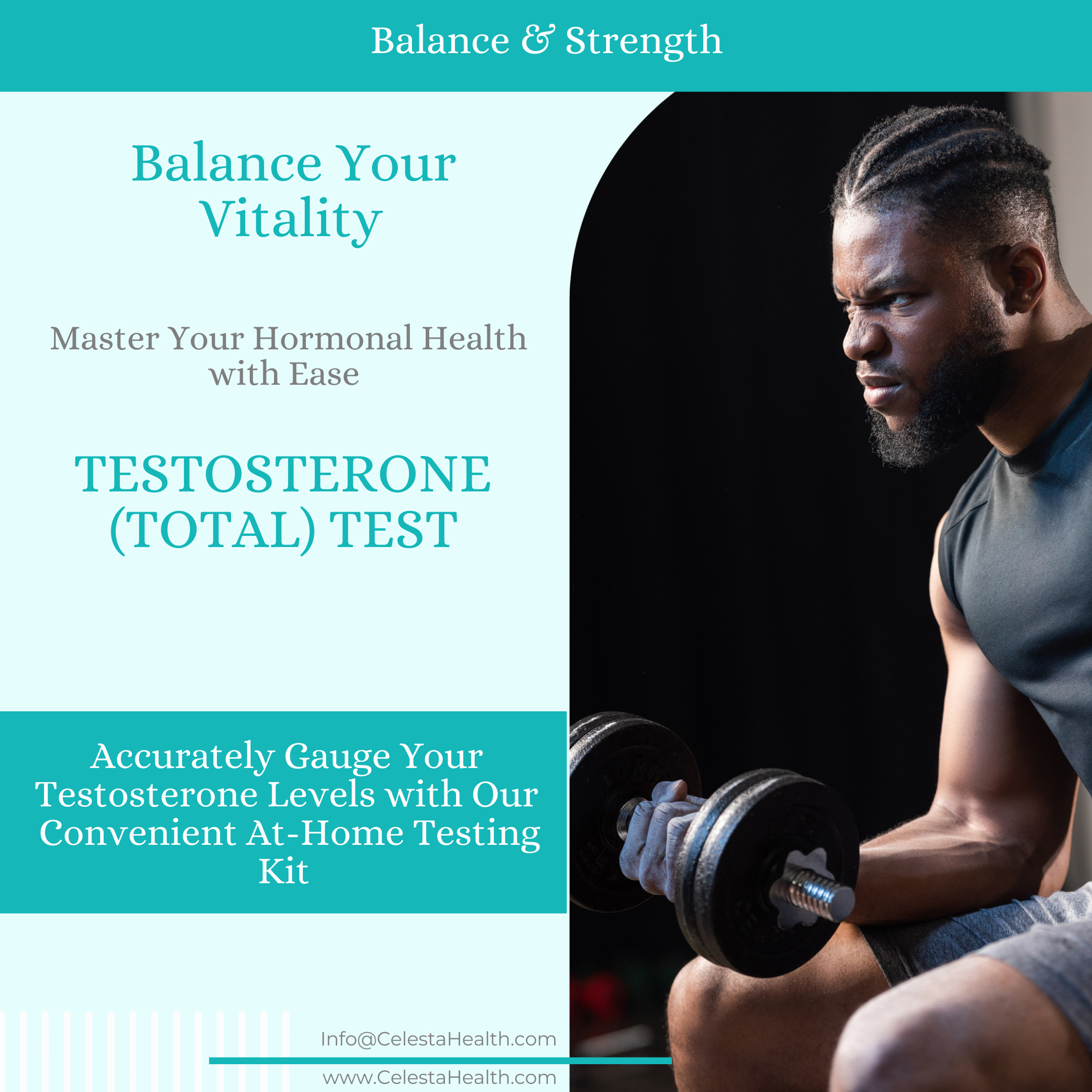Men’s Health
Unlock the Secrets to Optimal Male Health
Comprehensive Coverage
Our suite of at-home tests covers critical areas of men’s health, from hormones to heart health, giving you a well-rounded understanding of your wellbeing.
Telehealth at Your Service
Access our telehealth providers for expert advice based on your unique health profile so you can make informed decisions without delay.
Proactive Care
Take the driver’s seat in your health journey by identifying risks early, allowing for timely intervention and better health outcomes.
Celesta’s Commitment
We are dedicated to providing men with the specialized tests and resources needed for comprehensive health management.
At-Home Men’s Health Assessments
Men’s health is a multifaceted topic that encompasses physical, mental, and hormonal well-being.
%
Approximately 40% of men aged 45 and older have testosterone levels that fall below the normal range.
“Low testosterone affects an estimated 4 to 5 million men in the United States.”
– NIH Andrology Branch.
The Role of Testosterone in Male Health
Testosterone is a key hormone in men, impacting various bodily functions. Research shows that testosterone levels typically decline with age, starting around the age of 30. The American Urological Association estimates that about 2 in 10 men over the age of 60 have low testosterone, with the prevalence increasing to 3 in 10 for those in their 70s and 80s.
Understanding Low T (Low Testosterone)
Low T, or Low Testosterone, is a condition where the body produces insufficient testosterone, leading to symptoms like fatigue, decreased libido, and mood changes. The Mayo Clinic notes that low testosterone is often underdiagnosed, yet it can significantly affect a man’s health and quality of life.
Managing Low T for Optimal Health
Managing Low T effectively can involve a combination of lifestyle changes and medical interventions. The Endocrine Society recommends testosterone replacement therapy (TRT) for men with clinically low levels and symptoms that affect their quality of life. However, lifestyle changes, such as regular exercise, weight management, and a healthy diet, are also crucial.
The Importance of Testosterone and Hormone Testing
Regular testing for testosterone and other male hormones can play a critical role in maintaining and improving overall health and well-being. Hormone testing provides valuable insights into your body’s functioning, helping to identify potential issues early on. According to the Cleveland Clinic, early detection of hormone imbalances can lead to more effective treatments, improving quality of life, energy levels, and even mental health. Routine testing is especially important for men experiencing symptoms of Low T or other hormonal issues, as it allows healthcare providers to tailor treatment plans to individual needs.
Celesta Health: Transforming Men’s Hormone Health and Weight Loss with At-Home Testing Solutions
Men’s Health: The Critical Link Between Hormone Health and Weight Loss
Men’s health involves balancing physical, mental, and hormonal well-being. One of the most significant yet overlooked aspects of this balance is the connection between hormone health and weight loss. Hormonal imbalances, particularly low testosterone levels, can lead to fatigue, mood swings, and an inability to lose weight effectively. Research shows that around 40% of men over 45 experience low testosterone, a condition exacerbated by excess weight.
Men Hormone Testing: The Key to Effective Weight Loss Management
Understanding your hormone levels is crucial for addressing weight loss challenges. Celesta Health offers weight loss management tests and hormone health testing that provide insights into the hormonal and metabolic factors affecting your weight. These tests are the foundation of personalized strategies—including guidance on weight loss medication online to help men achieve their goals while improving overall health.
Empower Yourself with the Convenience of At-Home Hormone Testing for Men
To make health management more accessible, Celesta Health is offering at-home hormone testing kits. These kits, designed and validated by our team of experts, allow men to monitor testosterone and other hormone levels from the comfort of their homes. The process is simple and reliable, offering accurate insights into their health without requiring frequent doctor’s visits. Identifying hormone imbalances early is not just beneficial; it’s crucial. It enables interventions like hormone replacement therapy, targeted weight loss strategies, and lifestyle changes.
Understanding the Crucial Role of Hormones in Weight Loss
Hormones are vital in regulating metabolism, energy levels, and fat storage. Excess abdominal fat can suppress testosterone and elevate estrogen levels, creating a hormonal imbalance that hinders weight loss. Men can restore hormonal balance, enhance energy levels, and achieve sustainable results by focusing on hormone-health weight loss strategies, such as exercise, a balanced diet, stress reduction, and metabolism testing to identify underlying issues.
Addressing Emotional Barriers to Weight Loss
Mental health factors like low self-esteem and anxiety often compound weight challenges. Hormonal imbalances can amplify these issues, making it even harder to lose weight. Celesta Health’s holistic approach integrates physical and hormonal health to ensure lasting success.
Celesta Health’s Comprehensive Solutions for Men: Your Complete Health Partner
Celesta Health empowers men to take control of their health with advanced men weight loss testing and hormone health assessments. These services offer the insights and tools needed to address weight challenges, optimize hormones, and improve overall well-being.
Transform Your Health Today
Regular hormone health testing and proactive weight loss management are key to reclaiming energy, vitality, and confidence. Visit Celesta Health to explore at-home hormone testing kits, men weight loss management tests, and tailored solutions to achieve your health goals.



